Navigate and understand your DNA test results in our new display, where to find every report (with links) and what each section is about.
Waiting for your test results? Or perhaps you’ve come back to check what new stuff we’ve added like the updated health insights and questionnaire. Either way, this is the definitive introduction to your account from start to finish:
- Where to find your DNA results
- Navigate the dashboard
- How to read your disease risk results
- How to identify other important traits
- Understand your hereditary carrier status
- Planning for a healthy family
- Speak to our genetic counsellor
- All about your nutrition traits
- Sports and injury reports
- Personal traits, appearance and perception
- What is genetic ancestry?
- Get new insights with the health survey
- Scientific references and research
- Learn more about everything in the blog
How to access your DNA results
Go to our main page: https://atlasbiomed.com and click on the circular white icon in the top right hand corner. This will take you to the login page, enter your details and you’ll access the dashboard.
You will recognise it by the outline of a human head and shoulders. If you stay logged in, the icon will be blue. If you upload a profile pic, it will instead appear here instead.
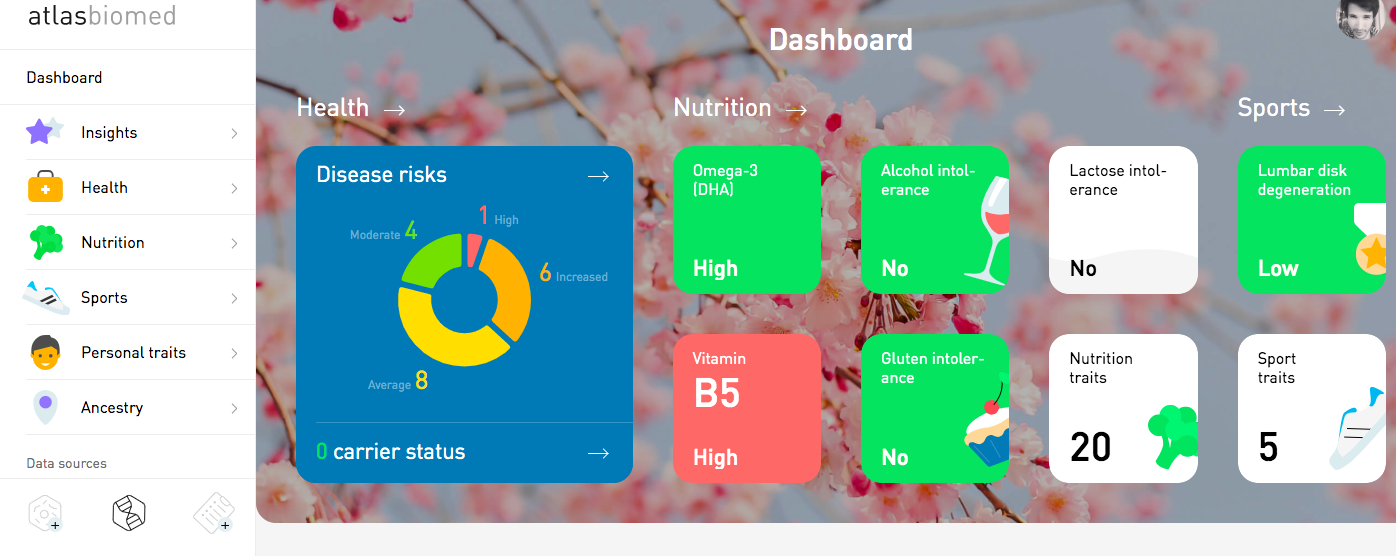
If you’ve taken the DNA and microbiome tests, scroll down on the left hand side menu until you see data sources and select the middle icon. It will allow you access only your DNA results.
Navigate your results
The dashboard can help you access every section of your results. They are organised into "reports" that unite all the findings about one subject onto one page.
| Report | What you'll learn |
| Common disease risks | Discover whether you are at low, average, increased or high risk of 19 common multifactorial diseases influenced by genes and lifestyle. |
| Hereditary disease status | See if you have any genetic disease risks and what it means for you and your children. |
| Nutrition and metabolism | Explore how genes impact your vitamin/mineral/nutrient levels, taste preferences, food intolerances and caffeine metabolism |
| Sports and injury | See how DNA influences your metabolism and if your genes indicate any specific injury risks |
| Personal traits | This part reviews unique ways that your DNA influences your appearance and perception of the world. |
| Genetic ancestry | Your parent’s haplogroups, Neanderthal DNA in your genome and ancestry composition by location |
| Insights | Personalised lifestyle recommendations designed to reduce your disease risks and improve your wellbeing | Health questionnaire | Answer the questions to get the most accurate risk profiles and recommendations based on your lifestyle. |
Understand the disease risk results

Your disease risk section is organised by importance from highest risk to lowest risk. On the dashboard, it is helpfully colour-coded by risk level to help you identify what steps to take.
| RED | Your disease risk is high, contact your GP and follow your recommendations to improve your health outcomes. |
| ORANGE | Your disease risk is increased compared to most people, manage your risk factors by making the right choices now and follow your recommendations to improve your outlook. |
| YELLOW | Your disease risk is average, now is the time where active prevention counts so follow your recommendations to improve your health outcomes. |
| GREEN | Your disease risk is moderate or low. That’s really good. Follow your recommendations to stay healthy for longer. |
How to identify other important traits
There’s a lot of information in this personal account, so our team of designers have worked incredibly hard to help you identify the important stuff in every genetic feature we assess.

Any trait highlighted in purple is worthy of your attention, but don’t worry - it’s not just negative stuff that we point out.
| Exclamation mark | This trait is associated with risks or features that can influence your health and wellbeing. |
| Medal | This feature is both positive and unusual, it bodes good things for you and your health. |
Your hereditary carrier status
Your genetic results will reveal one of only 2 options when it comes to your carrier status, it’s quite straightforward.
| Gene variant detected | If a gene variant associated with this condition is detected, click on the question mark to read the pop-up about what to do now and a brief explanation on how it may affect your children. Often you will be encouraged to contact a genetic counsellor and/or your GP. |
| No gene variant detected | This is what most results will show. Please remember that our test does not check for every gene variant of every hereditary condition. If you come from a family with a history of genetic disease, we encourage you to contact a genetic counsellor or GP about getting screened. |
The Atlas Biomed DNA Test analyses your genome to detect the most common gene variants associated with hereditary diseases. Your DNA is scanned for 327 hereditary conditions and to do so we actually compare tens of thousands of gene variants in your genetic code.
And even then, it’s not an exhaustive list because that would simply be too much data to process. Instead, we prioritise hereditary diseases by how common they are, and then applied the same logic to the subcategories of disease.

Let’s take cystic fibrosis as an example because it’s a very common hereditary disease in European populations. On top of that, there are thousands of genetic variants associated with this disease, so we prioritised by selecting the most frequent gene variants.
This is why it’s important to remember that our DNA test is for informational and educational purposes. Nowadays, we often have to take health into our own hands and so we’ve designed tests that can help people identify potential risks so they can get help from healthcare professionals.
Planning for a healthy family
Nearly two hundred years ago, an astute monk called Gregor Mendel elucidated a pattern of genetic transmission by crossing pea plants with different traits to see how these traits were passed on to the next generation. This mathematically predictable pattern is now known as Mendelian inheritance, and Mendel as the father of genetics.
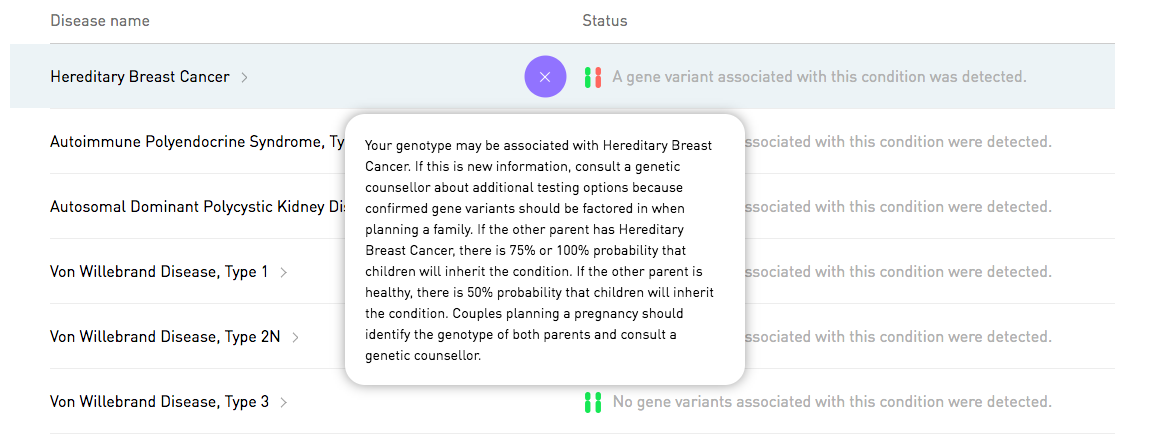
Nowadays we know that hereditary diseases have specific transmission patterns. Sometimes a disease can emerge from a change in your genetic code, but it is often passed down from parents to children.
This thought has been a source of too much strife for many families with sick children, even though it was through no fault of their own. It is really only now that we, as humans, have the technology to wrangle with hereditary disease by identifying it in time.
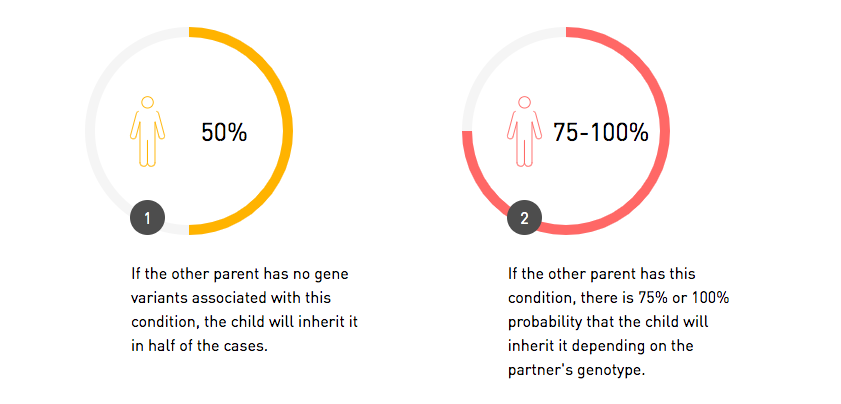
If a carrier status is detected in your sample, click on the disease in your personal account to access the information page. It will bring you to the report that includes a description of the disease and special parental planning section.
Parental planning explains the risk estimate for your children if one or both parents are carriers. There are a few cases when genetic testing for both parents can help families make the right decisions for the health of their children:
- known hereditary disease risks in your and/or your partner’s family
- suspected risk of specific illnesses based on family history
- coming from a small ethnic group or isolated geographical area
- not knowing your biological parents or family history
It can take either one or both parents to transmit a hereditary disease to their children. Parents can pass on a carrier status or possibly even make their children sick. Sometimes, the disease is only carried by girls but boys will always get sick. And that’s why tools like our DNA test and specialists like our genetic counsellor can help.
Genetic counselling services
We understand that getting your DNA test results can be confusing and you probably still have questions no matter how well we distilled your results into simple English. That’s why Atlas Biomed has become the first company in the UK to offer genetic counselling services to our customers.
Our certified Genetic Counsellor has all the right qualifications and has advised countless families on their genetic risks for over a decade. Things you can ask a genetic counsellor:
- How do these results can affect my health?
- My partner carries a hereditary disease, what about our children?
- It says I’m at risk, should I contact my GP about getting tested?
- I’m predisposed to low iron levels, does that mean I’m sick?
- How can I improve my disease risk profile?
Forget Google, ask a professional instead. Contact [email protected] for more information about our genetic counselling services.
All about your nutrition traits
Nutrients
Our nutrition traits cover the genetic specifics that determine how your body deals with a number of vitamins, minerals and fatty acids. These compounds are essential for the body, but need to be absorbed from food and then transformed into active substances that the body needs.
Our genes encode proteins called enzymes that make these nutrients accessible for the body, we call this bioavailability. For some people, their genes might cause them to accumulate too much of one compound or, on the contrary, make them more likely to have a deficiency.

Take iron as an example. Some people are genetically predisposed to high levels of iron and that’s a problem because iron can accumulate in the body’s tissues and organs leading to health problems.
In other cases, the body can’t extract enough iron from food, even if they are getting the right recommended daily allowance (RDA), and that can put them at risk of anaemia. This condition is characterised by fatigue and weakness, because iron is a part of the blood cells that transport oxygen to the muscles.
Eating behaviour
We’ll bet you know someone who can’t tolerate the taste of coriander and probably a few others who accuse some vegetables of being bitter, even though you think they’re delicious.

Genetic eating behaviours might seem like pub quiz facts, but they’re actually quite important: as science progresses, we hope to add more. And why, you must wonder.
It’s simple, eating behaviours affect food choices and what you eat can influence your health for better and for worse. So if you have an aversion to bitter flavours, you’re probably going to avoid those iron-rich dark leafy greens and the sharp palate of plants like chicory. Overall, this has the potential to decrease your daily intake of foods that can benefit your body as well as your gut microbes.
☝️DEFINITION☝️ The gut microbiome is an ecosystem of mostly bacteria that resides in the human colon. A healthy microbiome provides protection against disease and supports both physical and mental health in a variety of ways.
Food intolerances
As we've discussed, your body uses enzymes to break down things you drink and eat into particles that will either nourish your body or get flushed down the loo.

Alcohol and lactose intolerance arise when the body doesn’t produce enough of the right enzyme to do the job. And sometimes these foods trigger a cascade of immune responses that cause discomfort and sometimes serious issues. Interestingly, alcohol and lactose intolerances are genetic traits that affect whole populations.
Gluten is a protein that naturally occurs in wheat, barley and some other grains. It can trigger an inflammatory immune response when consumed. There are genetic markers predisposing to gluten intolerance that we analyse with this test.
Sports and injury reports
Athletic performance and injury risk have always been hot currency in the genetic world because every country and team wants to bask in the soft glow of Olympic medals and prize money. And while some may be tempted to see if their child is the next David Beckham, experts agree:
“[…]in the current state of knowledge, no child or young athlete should be exposed to direct-to-consumer genetic testing to define training regimens or to identify talented individuals for athletics."
British Journal of Sports Medicine
We’ve selected the most reliable genetic traits from research in this field to help you understand how DNA can influence your performance. These include BCAA metabolism as well as red blood cell count, some hormones and L-carnitine.

BCAA metabolism looks at how effectively the body uses branch chain amino acids, which are the building blocks of proteins, extracted from food. More effective metabolism can contribute to muscle growth and adaptation to effort. On the other hand, less effective BCAA metabolism might influence how efficiently you gain muscle mass in response to exercise.

Your injury risk profiles can tell you if you are more or less likely to develop problems in certain areas, like sprains, ruptures and even inguinal hernia. We only highlight injury profiles that are associated with specific gene variants and combinations of gene variants. If it says nothing, then you are no more or less likely to be injured than anyone else. That’s why your friend’s profile might have 2 injury risks and yours none.
Personal traits, appearance and perception
Genetics, it's serious business. But that isn’t to say that along the way, scientists have only been shedding tears of boredom and sadness. Somehow, little blooms of fun have sprouted in the serious pavement of science and we thought we’d share them.

The Atlas Biomed DNA Test includes cheerful details like how strongly you perceive the smell of violets and whether you can smell and/or produce asparagus-smelling urine. We’ll also tell you interesting facts about your hair, eyes and what type of earwax you produce.

Of course, we’ve been grilled on how these traits are relevant to science and to our users. Fortunately, we really do know a lot about human DNA and genetic testing so we have good answers. So, in addition to being a fun fact worthy of after-work conversations, such research can contribute to understanding how human genes influence metabolic and sensory pathways.

And while the application of findings on asparagus-smelling urine (and other such traits) may not be obvious right now, it may one day be used to support research into more medically-valuable findings.
What is genetic ancestry?
Admittedly, our services can’t connect you with long-lost cousins, but that also means we won’t accidentally reveal that you are actually the lovechild of a travelling salesman or the milkman. And such considerations are particularly important, albeit rarely discussed.
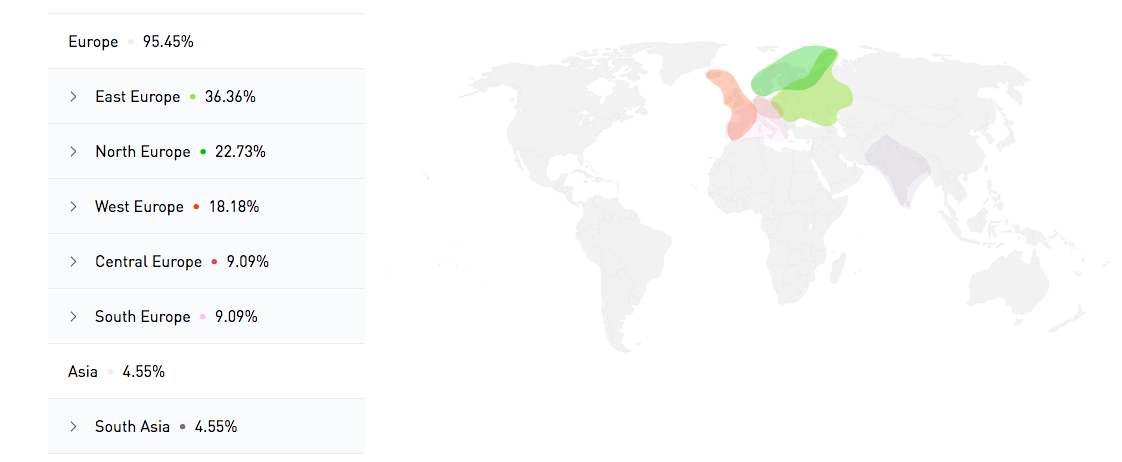
What we can tell you are titbits of archaic knowledge stored in your genes about where your ancestors are from and their migrations. We use haplogroups to do this.
Children recieve haplogroups from their parents: boys inherit genetic information about their paternal and maternal haplogroups, and girls only the maternal haplogroup. The maternal haplogroup transmits your mitochondrial DNA. Also known as the powerhouse of the cell, the mitochondria in every cell of your body come from your mother.
Haplogroups are sets of genetic variants that are specific to groups of humans. They allow us to trace back the migrations of your ancestors over thousands of years using changes in their genome to see how they travelled across the globe in search of the perfect home.

We’ll also break down the percentage of your DNA associated with specific geographic areas, like different parts of Europe, Asia, Africa and the Middle East.
And you’ll also discover how much Neanderthal DNA is in your genome. And don’t forget to check out the animated video of your family’s ancestral migrations across the globe.
New insights with the health questionnaire
So you've bought our test, sent in your sample and read your results. But to get real bang for your buck, you need to spend about 20 minutes answering odd questions about how many tablespoons of vegetables you eat per week and whether you were born by C-section.
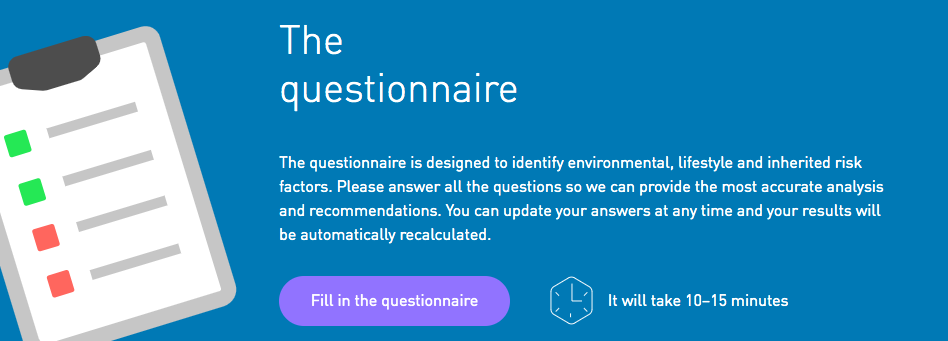
We know the questions are weird and you’ve never measured your vegetable intake in spoons but it’s totally worth it, we promise. Mainly because health outcomes are largely influenced by environmental factors like lifestyle, sports and diet as well as family and medical history.

On top of that, we actually update our calculations using the latest science about every six months. So, chances are, there are some new questions to answer, and therefore new health insights and new recommendations!
To find your health questionnaire in a jiffy, just navigate using the third icon below Data sources in the menu on the left.
Ready to refresh your health insights? Good, because it won't take long if you head to your personal account right now.
Scientific references and research
We've included the references for every scientific paper used to generate your report. That's because transparency is paramount in this field: you deserve to know how we came to this conclusion.

We hope that it will also allow you to explore and self-educate by directing you to the studies used to establish your results.
The Atlas Biomed family includes an active research department who publish regularly in scientific journals. Sometimes we invite users to participate in surveys to further research in this field, so keep an eye on your emails.
Don't forget the blog
In addition to a team of scientists, we also have journalists investigating the latest research on how DNA, the gut microbiome and lifestyle affect your body. Their job is to summarise the research in ways that you can understand and publish it on the Atlas Biomed Blog.
We don't dilute the science with oversimplifications, rather we try to give you the tools and knowledge to cultivate your understanding of basic concepts about health, the microbiome and DNA.
Two articles are published every week and it's mostly about the science. You can sign up for the weekly email digest if you don't have time to come and visit: it arrives every Tuesday at 10am GMT. We don't spam, that's a guarantee.
☝️TIP☝️ Send your science questions to [email protected] and we might even write about it!
















